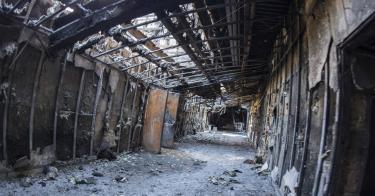Just a little over one week into his new term as Russia’s president, Vladimir Putin finds himself facing an enormous and somewhat unexpected task: reforming Russia’s regional governments.
The pressure for reform was recently heightened by a tragedy in Kemerovo, a city of about 500,000 in southern Siberia.
Last Sunday, a fire broke out in a Kemerovo mall. Speculation as to the cause ranges from an electrical short-circuit, to arson by teenagers, or the lit candles on a child’s birthday cake. What is known is that at least 64 people—41 of them children—died in the blaze.
Now the people of Kemerovo are calling for local authorities to resign.
Their outrage is understandable. According to one woman’s account on Twitter (translated from Russian by the author), she attempted to break through a cinema theater on the fourth floor where her children were burning alive. She heard their screams and from her daughter, “Mama, why is no one saving us? We are suffocating. […] Mama, I love you. I am dying.” The mother said she begged and pleaded for nearby firefighters to help, but they just stood there.
Her account may or not be completely reliable. Regardless, there is no doubt that officials failed to take the right steps—both to prevent this tragedy, and to rescue more victims in the midst of it.
Contributing to the massive loss were blatant violations of the building code and blocked fire escapes. Moreover, reports that a security guard disabled the fire alarm once it went off that afternoon have now been confirmed. The Investigative Committee, Russia’s equivalent of the FBI, continues to look into other possible criminal behaviors that may have exacerbated the situation.
Why is this Putin’s problem? After all, he did make a fair effort in the wake of the fire, declaring March 28 a national day of mourning and personally trekking from Moscow to Kemerovo on the 27th to pay his respects and meet with some of the local authorities.
However, while Putin was meeting with those authorities, approximately 1,500 residents gathered at the steps of the regional administration building to protest local officials’ negligence in enforcing safety regulations and their failure to perform basic duties. They also called for the resignations of the mayor as well as the regional government. The fact that the governor of the Kemerovo region apologized only to Putin—not to the victims’ families—reinforced the validity of their protest.
Nonetheless, their anger extended beyond local authorities. Those present at the rally also protested against the president, shouting, “Putin, resign! Putin, resign!”
This is surprising since just last week, over 80 percent of the official vote in the Kemerovo region went straight to Putin.
Why the calls for his resignation and sudden hatred of him?
Because this fire is only one of many that have broken out since Putin’s presidential reign began in 2000. The steady list of calamities reveals the corruption that so fluently trickles down from the Kremlin into regional governing bodies. If the national and regional governments were not so corrupt, carelessness would not be so rampant, and tragedies would be much rarer.
A little over a week since his win, it is evident that Putin needs to focus less on building his empire and more on fixing his nation’s governmental system. Fair, just and competent leaders are needed to avert catastrophes like the Kemerovo fire in the future.
That will require a lot of work, and Putin would be better off getting it done sooner rather than later—not only for his benefit as Russia’s leader, but even more so for his people.
This piece originally appeared in Real Clear World



